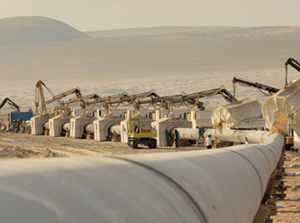By Gabi A.
Getting the oil flowing again is a basic requirement for the success of any future government.

Even as fears of continued factional conflict continue to attract media attention, the question of economic stability and sustainability in Yemen has barely received the consideration needed to avoid a spiral into the status of a failed state. The interim government in the country faces difficult political challenges in the weeks ahead as it prepares for what many observers are hoping will be the country’s first free election. The head of the interim government, Vice President Abed Rabbo Mansour Hadi, is already facing calls to resign as protests continue to rage in the streets of the capital city of Sanaa with demonstrators facing off against forces loyal to now supposedly deposed President Ali Abdullah Saleh.
The destruction brought on by the nearly-ten-month uprising against the regime of Saleh has wreaked havoc not only on the delicate political system but also on the nation’s oil production infrastructure that provides the lifeblood for the economy. Oil exports are responsible for somewhere between 60-70% of government revenues and 90% of overall national exports.
An announcement on December 21 by Oil Minister Hisham Sharaf that Yemen has suffered a 700 million USD loss to the energy industry during the uprising highlights the massive challenge facing reconstruction efforts in the embattled nation. As a whole, the turmoil of the past year is said to have cost the Republic some $10 billion across the whole of the economy.
The slide into anarchy during the revolution has led to a situation where the focus of the central government has fallen away from its role as the provider of security for this essential industry. The most poignant evidence of this security deficit over the past year is the closing of Yemen’s main refinery in Aden. The constant attacks on the oil pipelines have occurred primarily in the southern Abyan and eastern Ma’rib oil producing provinces by disgruntled tribes and al-Qaeda linked militias.
Yemen is already looking to its neighbors to help sustain its economy in order to maintain stability. Recalling the riots of the summer at the gas pumps, Saudi Arabia and the United Arab Emirates have a vested interest in keeping Yemen afloat. They are keenly aware that the troubles stemming from a failed state in Yemen will quickly find its way across their southern borders. In July, the Saudis donated some three million barrels of crude to help bail out the oil industry but the destruction of the pipelines no longer make this a viable option. The Yemeni government has already announced that it is looking to purchase some 120 thousand tons of gasoline in January, a staple that it was once able to produce for itself but will now add to its growing budget deficit.
While aid from the international community and Yemen’s regional neighbors will be crucial in restarting the economy, it is difficult to see any real progress on the horizon so long as the government is unable to provide security not only for its citizens, but for the oil industry as well. International institutions have halted aid and are unlikely to become involved until after the political situation begins to stabilize and a responsible party emerges. Yemen is well known for its wild-west-like lawlessness in its many tribal regions. The growing secessionist movement in the south should be of great concern to the government in Sanaa. The addition of the Islamist insurgency in the south has only served to complicate the situation. These factors aside, the central government is beholden to understand that without the promise of basic security for its infrastructure and personnel, oil companies are unlikely to reinvest. Yemen doesn’t have the ability to launch a domestic drilling industry and is reliant on international groups to sign on for such operations. There are glimmers of hope from reports this week about the start of negotiations with foreign oil interests that include Kuwait Energy, Callvalley and OMV. However, the recent killing of a British employee of one of the foreign oil companies highlights the dangers that face corporations looking to do business in the unstable state.
Addressing these challenges will take a sense of purpose in which none of the leaders in Yemen appear to posses. The inability to provide for the security of the oil industry is going to continue to ward off potential investors. Buying fuel to meet current needs is only a short-term solution and in the long run will only add to the long list of difficulties. Unfortunately, with no political solution in the foreseeable future, foreign aid is unlikely to arrive in time to prop up the recovery efforts in time. Without security, hopes for the needed investments appear to be quickly evaporating.
What’s next for Yemen? Get the inside scoop!